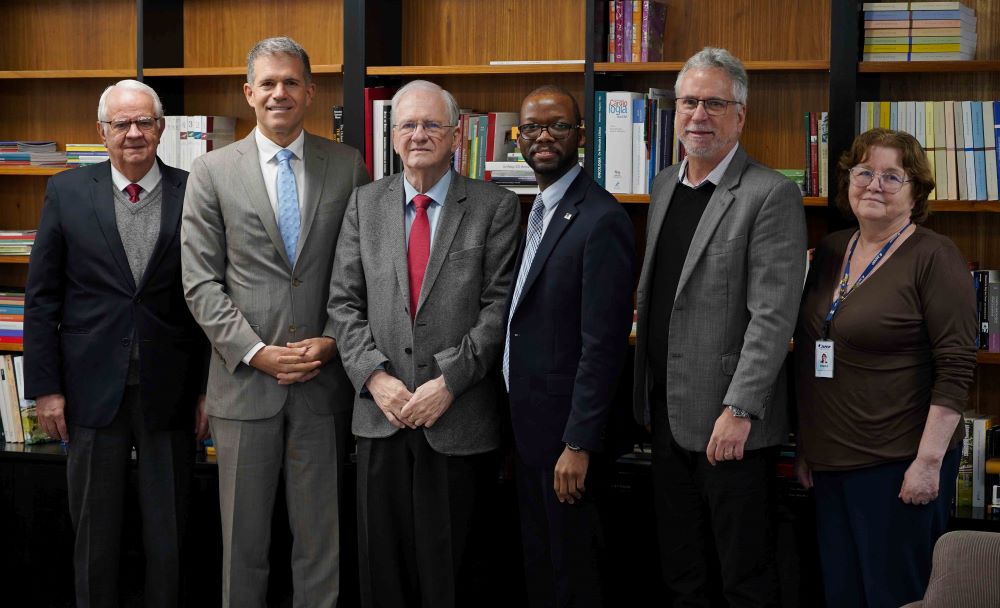

Left to right: Raul Machado, Richard Glenn, Marco Antonio Zago, Darryl Turner, Marcio de Castro, and Concepta McManus Pimentel (photo: Daniel Antônio/Agência FAPESP)
Richard Glenn’s aim on his first official visit to Brazil was to strengthen the ties of partnership with FAPESP.
Richard Glenn’s aim on his first official visit to Brazil was to strengthen the ties of partnership with FAPESP.

Left to right: Raul Machado, Richard Glenn, Marco Antonio Zago, Darryl Turner, Marcio de Castro, and Concepta McManus Pimentel (photo: Daniel Antônio/Agência FAPESP)
Agência FAPESP – FAPESP’s leadership was visited on August 13 by the new United States Consul General in São Paulo, Richard Glenn, who took office at the end of July. He was accompanied on this visit by Darryl Turner, Consul for Economic Affairs, Environment, Science, Technology and Health. The purpose of the meeting was to “strengthen the ties of partnership” with FAPESP.
“I’ve been in Brazil for a couple of weeks, and this is the first time I’ve made a call outside the consulate, which shows how highly we value the relationship between FAPESP and the government of the United States. I want to make clear the importance of scientific research and the partnership between the United States and Brazil,” Glenn told Agência FAPESP.
Marco Antonio Zago, President of FAPESP, commented on the many collaboration agreements FAPESP has signed with U.S. universities, research centers and funders, highlighting its partnership with the National Science Foundation (NSF).
“We’re particularly proud of our relationship with NSF, which served as a model for the creation of FAPESP. During the post-war period, the people who set up FAPESP looked at what was happening in the U.S. and took inspiration from NSF,” Zago recalled. “We’ve always had a positive two-way exchange with NSF. The relationship is now stronger than ever. Several joint calls for proposals are being planned.”
“And we have a visit to NSF’s headquarters scheduled for September,” added Marcio de Castro Silva Filho, Scientific Director of FAPESP.
Concepta McManus Pimentel, the Scientific Directorate’s Manager of Research Collaboration, presented data on the science produced as a result of collaboration between researchers in São Paulo state and the United States. “More than 4,000 collaborative papers are published every year. The leading knowledge areas are medicine with 25.4%, physics with 11.4%, and biochemistry with 10.9%, and the main funder is FAPESP,” she said.
Also according to Pimentel, the impact of the articles published by São Paulo’s scientists is twice the world average when they do so in collaboration with U.S. scientists, and ten times the average in the case of articles cited in public policies.
Glenn expressed interest in finding out more about everything done by FAPESP and universities in the state to promote inclusion and gender equity, as well as the projects under way to address the impacts of global climate change. On this topic, Zago highlighted the Amazon+10 Initiative, devised by FAPESP and currently led by the National Council of State Research Foundations (CONFAP).
Raul Machado, an advisor to the President of FAPESP, also attended the meeting.
Republish
The Agency FAPESP licenses news via Creative Commons (CC-BY-NC-ND) so that they can be republished free of charge and in a simple way by other digital or printed vehicles. Agência FAPESP must be credited as the source of the content being republished and the name of the reporter (if any) must be attributed. Using the HMTL button below allows compliance with these rules, detailed in Digital Republishing Policy FAPESP.





